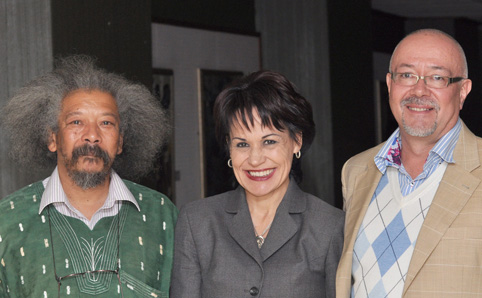Latest News Archive
Please select Category, Year, and then Month to display items
![]()
#UFSupdate (18 March 2020): UFS IMPLEMENTS MEASURES TO MINIMISE RISK OF COVID-19 TO STAFF
STATEMENT BY PROF FRANCIS PETERSEN, RECTOR AND VICE-CHANCELLOR
The executive management of the University of the Free State (UFS) welcomes the announcement of Dr Blade Nzimande, Minister of Higher Education, Science and Technology on 17 March 2020 that all post-school training institutions will have an early recess, starting on 18 March 2020. The Minister’s directive that universities should minimise risk of COVID-19 to all its staff during this time is also welcomed.
The announcement of Dr Nzimande is in line with the university’s decision on 16 March 2020 to suspend the academic programme as from 17 March 2020 and to resume it again on 14 April 2020.
It is important for us all to know that this is not business as usual, and that different thinking is required. Responsible citizenship is one of the crucial elements the world has increasingly been experiencing for the past few weeks. This is why we must act out our responsibility towards one another by focusing on ways in which social distancing can be achieved – especially during this low-risk period that South Africa is still experiencing. This is one of the reasons that informed the university’s decision on 16 March 2020 week to suspend the academic programme and also for students to vacate the residences by 20 March 2020.
The health and well-being of our staff members are equally important. The university’s Employee Task Team that was established on 16 March 2020 analysed options for the continuation of university operations during the recess period. These options were submitted to the executive management, discussed with the Chairperson of the UFS Council and approved on 18 March 2020.
Staff members who have children at school and pre-school may work from home on 19 and 20 March 2020. For the period 23 March 2020 to 13 April 2020, the number of staff members present on all three campuses will be reduced to a minimum and staff members may be allowed to work from home where practically possible.
Arrangements have been made to accommodate those staff members who are performing services which cannot be done from home (such as cleaning, gardening, maintenance, sports, etc) in a flexible and reasonable way. Similar arrangements will be made with office-based support services staff, prioritising institutional needs and based on humane and personal circumstances. Academic staff have been requested to ensure that the online learning materials are finalised and made available for the online learning platform.
The decision for employees to work from home is based on the premise that all employees are deemed to be at work from 23 March 2020 to 13 April 2020. This requires staff members to be available and contactable by line managers at all times during the university’s normal working hours.
I am comfortable that these measures will alleviate the concerns from our staff regarding the spreading of COVID-19 and the risk to themselves without compromising university operations.
Prof F W Petersen
Rector and Vice-Chancellor
University of the Free State
UFS outlines research achievements
2011-09-02
|

|
|
At the launch of the 2010 Annual Research Report, were from the left: Mr Robert Kriger, the director for Policy and Strategy at the National Research Foundation (NRF); Prof. Driekie Hay, Vice-Rector: Academic and Prof. Frans Swanepoel, Senior Director: Research Development.
Photo: Stephen Collett
|
The University of the Free State (UFS) is well on course for delivery on its most important academic duty as a research university. This was the message that came forward at the launch of the 2010 Annual Research Report of the UFS on 30 August 2011.
Speakers at the launch, which included Prof. Jonathan Jansen, Vice-Chancellor and Rector, as well as Prof. Driekie Hay, Vice-Rector: Academics outlined the key strategies and achievements of the UFS for the 2010 academic year. This included the establishment of a Postgraduate School at the UFS, the first of its kind at a public university in South Africa. Prof. Hay told guests that the aim of the Postgraduate School was to broaden research and deepens scholarship on postgraduate education in the country. She highlighted some initiatives the UFS undertook in 2010 to build and maintain its intellectual capital. Some of these initiatives included the appointment of seven senior professors and recruiting more female and black scholars and academics.
Also speaking at the event was Mr Robert Kriger, the director for Policy and Strategy at the National Research Foundation (NRF). Kriger reflected on the brilliant minds of scholars such as Archie Mafeje, Lewis Nkosi and Dennis Brutus and argued for efforts to increase the country’s research output.
Some highlights of the 2010 Annual Research Report:
- The total funding available for research at the UFS increased from approximately R199 million in 2009 to just over R210 million in 2010. A total of R31.8 million was made available from central university funds.
- In 2010 the UFS was home to 92 NRF-rated researchers. During 2010, four researchers applied for re-evaluation and of these, two improved their rating, while a further five received a first-time rating.
- The Faculty of Natural and Agricultural Sciences continue to be the most prolific producer of publications in accredited journals, while the Faculty of Education has shown a 54% increase in its publication output.
- Staff members in the Physics department at the UFS Qwaqwa Campus published 22 papers in international peer-reviewed journals during 2010.
- Also at the Qwaqwa Campus: Ms Khethiwe Mtshali,a postgraduate student in the parasitology research unit of the Department of Zoology and Entomology, received a best Honours presenter award at the 1st Annual Research symposium of the National Zoological Gardens of South Africa.